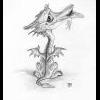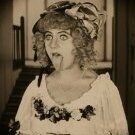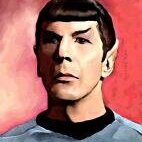All Activity
- Past hour
-
The Best First Books for Babies and Toddlers
KEV67 replied to Hayley's topic in Children's / Young Adult
I tried reading the page without showing it and he still walked across the room. He definitely remembers the words. Maybe he does not understand what they all mean, but he remembers them. In another Sue Hendra / Paul Linnet book, Nobot the Robot with no Bottom, there was a page in which Bear says he could not use Bernard the robot's bottom in his drum kit, because it made a funny noise. I used to look at Adrian and say, 'Does your bottom make a funny noise?' First, he laughed, which made me wonder how much he understood. Lately, he looks at me at me in a funny way when we get to that page. So far, the best clues I have of Adrian understanding any language is his sense of humour. I have been resisting buying any of the Supertato books by Hendra and Linnet. But since I am having difficulty getting Adrian to eat any fruit and vegetables, I bought one. - Today
-

The Best First Books for Babies and Toddlers
Hayley replied to Hayley's topic in Children's / Young Adult
Thank you That does sound like a fun book. Maybe you could try telling the story (or a story, if it's too long to remember) without the book, to see if Adrian still reacts when you say the word 'tickling'? There's certainly nothing wrong with his memory anyway, even if he's learned what comes next from the pictures -
Farewell, Earth's Bliss (1966) D. G Compton I often say that my guilty pleasure in literature is post-apocalyptic fiction (and it is) but I've been trying to expand my general sci-fi consumption lately albeit with the desire that the books should explore something existential or something philosophical (I'm not that interested in aliens and sweeping space operas). So yeah, something small but intriguing, and this writer's name came my way. It was probably a very good choice because the book does not dwell on epic sci-fi themes and instead tells a rather straight-forward and small story of hardship. The book opens with several characters (I think 22) aboard a space ship heading for Mars. These people are convicts being sent to a penal colony settlement they know very little about. They are given biblical names (Jacob, Simon, Mark, Rachel etc) and consume drugged food for the nine week trip to better cope with almost no physical activity. Once they arrive, they are immediately caught in a storm that kills several of them (I did not entirely like this chapter because Compton jumps ahead in time rather abruptly) before the locals arrive to take them to the settlement. Here they discover that it is a self-maintained colony where the criminals (some of their crimes are severe but others are trivial) have created their own small but workable civilisation. Life is very hard and everyone is expected to contribute, pull their weight, or face severe punishment. And that's basically it, that's as far as the sci-fi elements of the story ever goes. But that's the point because, to me at least, this is a novel where Compton is exploring hardship and its beneficial consequences to the human soul. When you remove comfort and freedom, this often (counter intuitively) results in a society that is mentally healthy, robust, deeply satisfied, and ultimately very strong. It feels wrong to acknowledge it, given the hardships involved, but many (often the ones you least expect) take to this new life and thrive while others cannot handle it. The book has a bleak, even cynical take on the human condition. Racism, sexism, homophobia, all present and correct, but the fundamental philosophy of this place and its people is... if you work hard and contribute, you will be rewarded. But obviously this is not always the case. Some people will simply die because of the conditions, because that too is the nature of this kind of life. I really enjoyed this (especially the early chapters) and thought Compton's writing was very fun to read. The book is science fiction in only the most tangential way, its ideas more in line with an existentialist exploration of a life at its more authentic, its most demanding. It's a difficult narrative to sell because it goes against our instincts. Nothing is quite so satisfying as a delicious meal and some good hearty sexual intercourse after a twelve hour day of intense labour and toil. Yet, equally, nothing is quite so bleak. Very interesting. Very good. 6/10
-

Your Book Activity 2025
lunababymoonchild replied to lunababymoonchild's topic in Book Blogs - Discuss your reading!
Just ordered Heartbeats, the autobiography of Bjorn Borg. A childhood hero of mine, I’m very much looking forward to reading it. -
Never Ending Song Titles - Part 8
Madeleine replied to Kylie's topic in Quiz Room / Thread Games Jokes etc
Falling into You - Celine Dion - Yesterday
-

Never Ending Song Titles - Part 8
muggle not replied to Kylie's topic in Quiz Room / Thread Games Jokes etc
Listen to the Rhythm of the Falling Rain -Cascades -
Oolong, don't take long...
-
Never Ending Song Titles - Part 8
Madeleine replied to Kylie's topic in Quiz Room / Thread Games Jokes etc
I can't stand the Rain - Eruption -
things like, 'Chamomile or
-

Never Ending Song Titles - Part 8
poppy replied to Kylie's topic in Quiz Room / Thread Games Jokes etc
I Wish It Would Rain Down ~ Phil Collins - Last week
-
Halloweird edited by Johnny Mains This is another collection from the British Library which covers the season of Samhain/Halloween. It includes short stories and some poetry (one from Rabbie Burns no less). Samhain is one of the two pagan fire festivals in Britain’s pagan year. The other is Beltane in May. The publication range is from 1780 to the 1970s: although most of the tales are pre 1930s. There is poetry from Mayne, Burns, Revi and Geraldine. Short stories by R Fryer, Elizabeth Train, Letitia Douglas, Edgar Wakeman, Lyllian Huntley (x2), Herminie Kavanagh, Alphonse Courlander, Eleanor Fitzgerald, Rachel Macnamara, Tod Robbins, Flavia Richardson, Edith Wharton, Elizabeth Walter, Virginia Lafefsky and Mary Williams (this one is excellent). There is the usual diet of spurned lovers, bone carriages, graveyards, castles, ghosts, ghouls, one set in the old US west (cowboys and all), unexpected apparitions and the usual sense of the reader saying “Don’t open that door!!” In more modern parlance FAFO. Then there’s the oddest line in the book from the poem “Twas the night of All Hallows” by Geraldine: “She lies there, but lo! most amazing to note, Encircling her neck was a FROLICSOME GOAT” Don’t ask. This is a good collection. There are a couple of duds, but some pretty good ones too. The cover art is effective too. 8 out of 10 Starting Fear in the Blood, Another collection in the Tales of the Weird series
-
harry potter and the chamber of secrets
courtneybethencourt replied to courtneybethencourt's topic in Past Book Logs
thanks Madeline much appreciated -

Your Book Activity 2025
Nataweeee replied to lunababymoonchild's topic in Book Blogs - Discuss your reading!
just started Eimear Mcbride's new book "The City Changes its Face" and gosh i just love the way she writes. -
Bolt From the Blue (2020) Jeremy Cooper A novel in the form of letters/postcards written between a mother and daughter across several decades starting in 1985 and ending in 2018. Cooper does a good job of offering small snippets of their lives until, by coalescing effect, it builds into a larger picture whereby you can sense the general volume of their lives, their relationships, their work, their gradual ageing and experience. In that sense, the small entries are effective as little pieces that add to the picture but it also means a lot of them are slightly redundant, easily dismissed, and the urge to skim read becomes increasingly tempting. I think I zoomed through this whole thing rather quickly in the end. As for the two protagonists, I can't say that I actually liked either of them to be honest but I especially found Lynne, the daughter, to be slightly insufferable. Not in any bad way, simply that she represents the banal middle-class rather beautifully and exhibits all the traits required for such a performative life (the book did remind me a little of Latronico's Perfection in this regard). She begins as an art student and over the years garners a certain amount of success as an artist possessing all the mundane political outlooks and opinions which such a person might. She marries an older man, Richard, doesn't want children, and fundamentally maintains a character which I found a tad cliched. Her mother is a little less overbearing, prone to keep at least one foot in the real world, but occasionally they write barbed letters to one another in a manner that strongly hints at anger, resentment, and an open dislike of one another. I guess this was Cooper's attempt at realism, making sure it never becomes too bland. For the most part, it's effective and overall I would say I enjoyed the book but found it mostly inoffensive and ultimately a little forgettable. There's something very light-weight about it, the story being trivial and bland, a snapshot of normality but one which is a little tedious, and it should be noted that the format is one which, I would imagine, was very easily manufactured given that it requires no plot, not great writing, and no particular effort. Plus, it's not exactly realistic, is it? People writing letters in 2014 etc. Cooper even comments on this in the form of an opening blurb by the daughter Lynne where she acknowledges (rather conveniently) it by reiterating: Well sure, in the fictional setting that's true but it's still a novel, Jeremy, still a piece of art created by an author. And, as such, you would hope there'd be a little more to it, a greater substance. But there isn't. So the book is very easy to read and did a reasonable job of (briefly) fleshing out two fictional creations into something more but was, when all is said and done, ultimately a rather gentle offering. I enjoyed Brian a lot more than this but I am still very much a fan of Cooper's writing. 7/10
-
muggle not started following France's reading 2025
-
I read Stone and Sky awhile back. I forgot to put it on my books read list. I thought it was one of his better books.
-
ElChristo1 joined the community
-
Hi All, Can anyone suggest a really excellent graphic novel? Something like Persepolis, Maus, Ghost World etc, but maybe a bit more modern. Thanks heaps in anticipation! 🙂
-
Never Ending Song Titles - Part 8
Madeleine replied to Kylie's topic in Quiz Room / Thread Games Jokes etc
Naked in the Rain - Blue Pearl -
Oh yes definitely, I do try to do most of them! In fact I've still got the folklore one outstanding, which I do intend to catch up with.
-

Never Ending Song Titles - Part 8
muggle not replied to Kylie's topic in Quiz Room / Thread Games Jokes etc
Singing in the Rain - Gene Kelly (this may be my favorite musical scene) -
I’m sorry to hear that. I hope that you’ll consider the next category in the new year.
-
Jane Harper is another very good Australian author, she has a trilogy with investigator Aaron Falk as the main character, plus a few stand alone books too. Peter May is another author, he has several series set in various locations around the world, his Lewis trilogy (set on the Scottish island of Lewis) is excellent.
-
I really enjoyed the previous Peter Grant book, after a couple of slightly below par books, so good to see another one on the way.
-
I don't fancy Moby Dick, I read Animal Farm at school, and read all the Herriot books when they first came out! thanks for the suggestions but I think I'll give this category a miss.
-
Never Ending Song Titles - Part 8
Madeleine replied to Kylie's topic in Quiz Room / Thread Games Jokes etc
Here comes the rain again - Eurythmics -
The Best First Books for Babies and Toddlers
KEV67 replied to Hayley's topic in Children's / Young Adult
Barry, the Fish with Fingers, is another book by Sue Hendra and Paul Linnet. Adrian makes me laugh, because the other fish ask Barry what he can do with his fingers. While Barry explains he can cut paper chains, knit and play with finger puppets, Adrian has taken to walking across the room, because the next page says 'tickling'. This makes me think Adrian has started to recognise words, but it is possible he recognised the picture.



